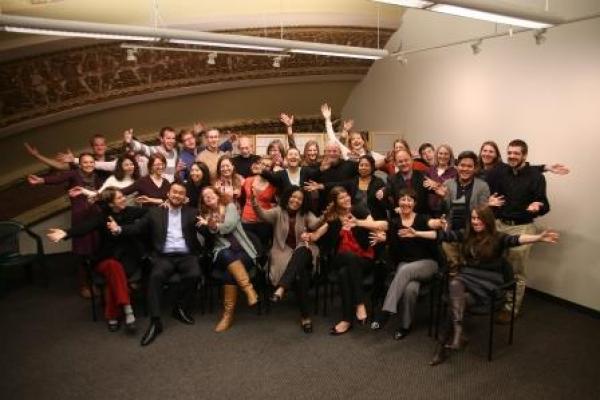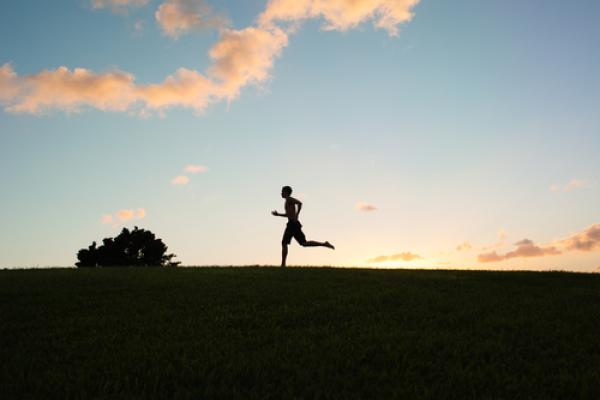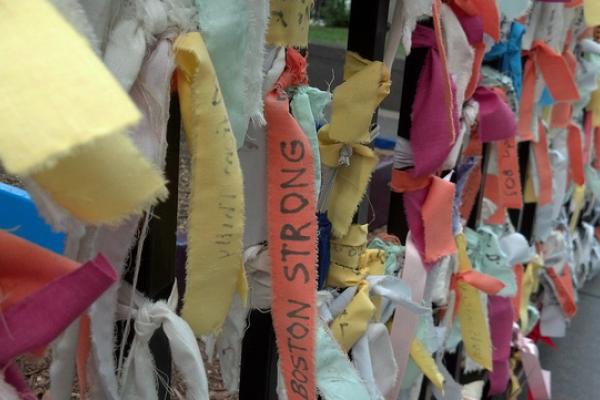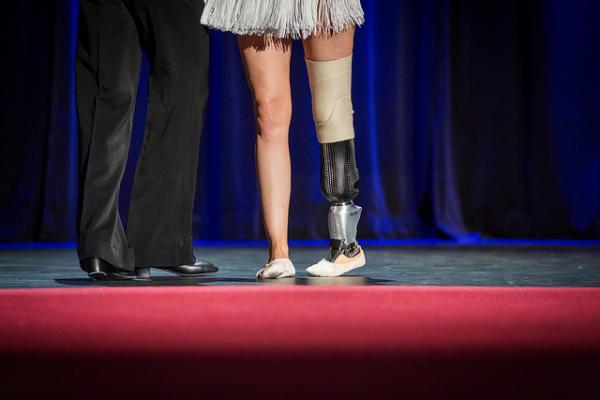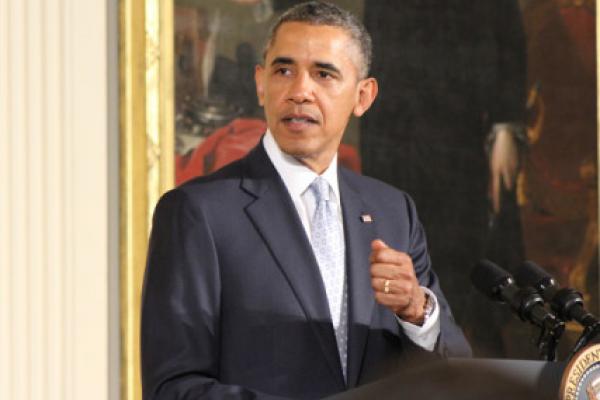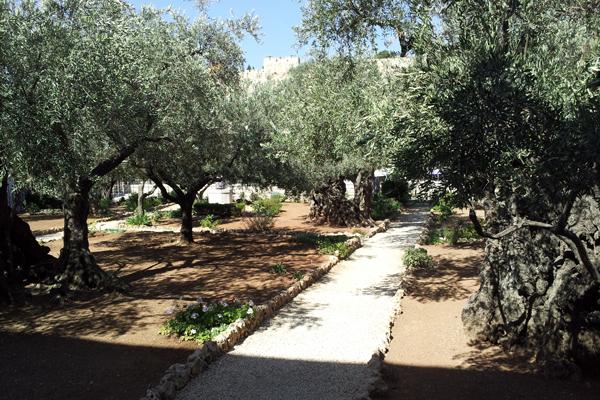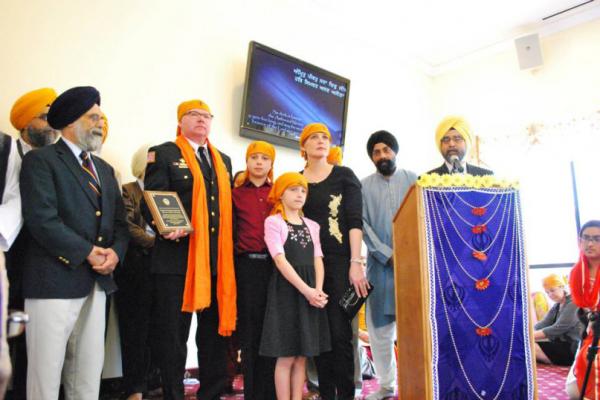It’s been a year of struggle and a year of rejoicing. We wanted to give you a glimpse into our lives here at Sojourners and also ask for your prayers. In particular, we hope that you will pray for our dear colleague and friend to many of us, Elizabeth Palmberg, or as many know her, “Zab.” You might have read some of her reporting or commentaries in the magazine or seen some of her videos about prayer, bread making, and other topics. If you’ve read the magazine or used one of our resources since Elizabeth arrived as an intern in 2002, you have likely seen something created, influenced, or just plain made better by Elizabeth.
I finished my first Boston Marathon in 2002, running with two parishioners to raise funds for our church. The experience was exhilarating, and I’ve run the course six times since, relishing each year the cascade of powerful moments. Speaking as a preacher, the marathon was the sermonic gift that kept giving: the challenge of Heartbreak Hill, the boost even we slow runners get from cheering multitudes, the necessity of water and salty snacks. And Hebrews 12 gives us our text: “Let us run with perseverance the race that is set before us …”
With last year’s Boston Marathon, however, everything changed. Our church did have a runner in the race — he crossed the finish line six minutes before the first bomb exploded — but any interest in locating metaphorical gems was overshadowed by the real-time incursion of evil. Some parishioners knew victims, others were near the scene, and everybody joined in the immediate grieving of our city.
When we learned later that the perpetrators were Muslim, we felt another round of anguish, fearing that the incident could trigger a wave of religious prejudice and bigotry.
My first marathon ever — 2003 in New York City — did not go according to plan. On the positive side, I would never have guessed that P. Diddy would be running the same marathon and at the same pace for much of it, providing an entertaining entourage to distract me from my exhaustion. On the negative side, my name, which I had taped to my tank top so the crowds could give me much-needed encouragement, quickly peeled off, and I was anonymous in the crowd. My plan had been to run that last mile to the mantra “you can do anything” or “you are power,” but instead, my legs barely moving and my husband and close friend no longer by my side, I chanted dejectedly to myself: “Never again, never again.”
I didn’t know what misery associated with a marathon really was, though, until I heard about the Boston Marathon bombings, which took place one year ago today. On this day, two young brothers set off two bombs at the end of the Boston Marathon. As we waited to understand the damage, I remember thinking about the juxtaposition of the runners’ feelings of accomplishment setting in just as shrapnel began to fly. Then I received the painful — even if relieving — news that my first cousin had been right at the finish line with her husband and baby (born a year ago exactly on that marathon Monday) and had escaped the violence only because the baby needed her nap. We eventually learned that three people were dead, hundreds were injured, and the two suspected perpetrators were associated with radical Islam. I felt disgust and horror.
Moments such as this challenge each of us to live up to the “better angels of our nature,” as President Abraham Lincoln put it. As has been borne out by various terrorist attacks around the globe, terrorism breeds fear — its intended consequence. Too often this fear becomes fear of a religious group. We, as Jews, know intimately the perils of a society surrendering to this type of fear.
Among the many images of the marathon victims that emerged shortly after the attack, I remember being most struck by the photographs of the injured victims, missing their once sturdy limbs, lying in hospital beds. For me, those images perfectly conveyed how our city was feeling at that moment. We had just had something ripped away from us. We were assaulted, grieving for our loss, and outraged that any human being could dare do this to us.
How would our injured victims respond? Within days, the answer was clear. They would remain resilient. Adrianne Haslet-Davis would dance again, now with a prosthetic limb. Never a runner before, Celeste Corcoran pledged to run a marathon, now on her two prosthetic limbs. And, shaken by the tragedy, Amanda North would quit her job and launch the dream of her own artisan business.
President Obama on Monday called for people of all faiths to deter gun violence and anti-Semitism, one day after a gunman killed three people at Jewish centers in suburban Kansas City.
“That this occurred now — as Jews were preparing to celebrate Passover, as Christians were observing Palm Sunday — makes this tragedy all the more painful,” the president said at his annual Easter Prayer Breakfast.
In the Garden of Gethsemane, Jesus utters his agonizing prayer, “Abba, Father, for you all things are possible; remove this cup from me; yet, not what I want, but what you want.”
Who among us hasn’t found ourselves in a situation where the inevitable seems impossible? Where the unavoidable seems unimaginable?
Who hasn’t said to God, in so many words, “Remove this cup”?
The most difficult thing in such a situation may be its crushing inevitability. You want to escape from your life, which suddenly feels like an oncoming train about to run you down. It is the shock you feel when you receive a frightening diagnosis from your physician. When you are laid off from a job. When a friend dies. When a relationship ends. You say to yourself, “This cannot be happening.”
Brian Murphy attended Catholic Mass regularly, both before and after he took 12 bullets while trying to defend a Sikh temple in Wisconsin from a gunman in 2012.
But he says the principles he’s learned from the Sikh temple have helped his recovery.
Now, a Maryland-based Sikh organization has honored the retired police officer for his service when a gunman killed six worshippers at the Sikh Temple of Wisconsin.
The Guru Gobind Singh Foundation, a Maryland-based Sikh advocacy organization, honored Murphy on Sunday — on Vaisakhi Day, a Sikh holy day — with a Sewa (service) Award, given annually to someone who has contributed to the Sikh community.
